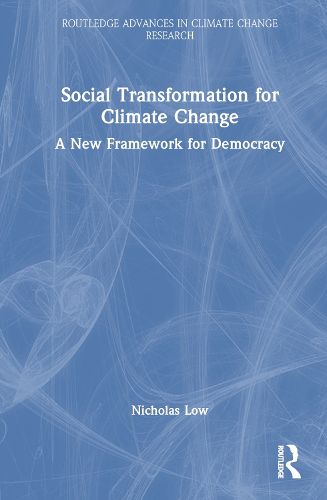Readings Newsletter
Become a Readings Member to make your shopping experience even easier.
Sign in or sign up for free!
You’re not far away from qualifying for FREE standard shipping within Australia
You’ve qualified for FREE standard shipping within Australia
The cart is loading…






This book argues that social transformation is both necessary and possible if democracies are to respond effectively to the climate crisis without social collapse.
Climate transformation and social transformation are intimately connected. Understanding how to address climate change requires a historical approach both to the climate and to our collective institutions of humanity. Drawing on the works of Karl Polanyi and Thomas Piketty, Nicholas Low traces the course of historic social transformations from Britain, Russia, and Australia to highlight key commonalities: social crisis, the widespread sense by those in power that 'something has to change', the shift in ideology, and the political champions that drove the change. Within its international scope, the book delves deeper into specific instances of inequality and poverty from Britain, the USA, Australia, and the Global South. It shows how these examples are connected with the current climate emergency. Finally, the author draws together all the evidence from past transformations to outline how a new social democratic transformation could generate a better future, creating the social solidarity necessary to cope with the climate crisis.
This book will be of great interest to students and scholars of climate change, environmental politics and policy, political ecology, environmental sociology, and environmental studies more broadly. Its argument is also highly relevant for political actors working towards social and economic transformation.
$9.00 standard shipping within Australia
FREE standard shipping within Australia for orders over $100.00
Express & International shipping calculated at checkout
This book argues that social transformation is both necessary and possible if democracies are to respond effectively to the climate crisis without social collapse.
Climate transformation and social transformation are intimately connected. Understanding how to address climate change requires a historical approach both to the climate and to our collective institutions of humanity. Drawing on the works of Karl Polanyi and Thomas Piketty, Nicholas Low traces the course of historic social transformations from Britain, Russia, and Australia to highlight key commonalities: social crisis, the widespread sense by those in power that 'something has to change', the shift in ideology, and the political champions that drove the change. Within its international scope, the book delves deeper into specific instances of inequality and poverty from Britain, the USA, Australia, and the Global South. It shows how these examples are connected with the current climate emergency. Finally, the author draws together all the evidence from past transformations to outline how a new social democratic transformation could generate a better future, creating the social solidarity necessary to cope with the climate crisis.
This book will be of great interest to students and scholars of climate change, environmental politics and policy, political ecology, environmental sociology, and environmental studies more broadly. Its argument is also highly relevant for political actors working towards social and economic transformation.